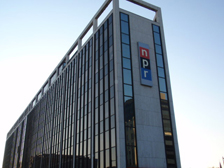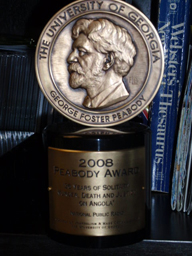National Public Radio

National Public Radio, Washington, DC.
National Public Radio was unique among broadcast radio organizations in the United States. It was established by an act of Congress. President Lyndon B. Johnson signed the Public Broadcasting Act in 1967, which created the Corporation for Public Broadcasting (CPB), a nonprofit, nongovernmental entity to promote public broadcasting. “It will be free, and it will be independent—and it will belong to all of our people,” Johnson said at the bill signing ceremony.
In 1970, the CPB, in accordance with this legislation, founded National Public Radio, an independent nonprofit membership organization that relied on funds generated by its activities. NPR would be neither a radio station nor an owner of radio stations. Instead, the organization would produce and provide news, information, talk, entertainment, and cultural programming to member stations. In 1971, NPR first aired All Things Considered , a weekday evening news program. Eight years later, another news program, Morning Edition debuted. Sullivan, as a reporter for the NPR News national desk, reported for both programs.
By 2008, NPR provided programming to more than 860 public radio stations in the United States. In addition to news, its wide-ranging programs covered arts and culture, sports, politics, and science. NPR, which had its headquarters in Washington, DC, gathered news from 36 bureaus around the world and relied on local coverage from more than 270 independent member public radio stations across the US. Its weekly audience went as high as 27.5 million listeners.
Despite its popularity, NPR had had its share of financial difficulties. In 1983, its debt reached $7 million, and the organization underwent a financial restructuring. No longer would it receive money directly from CPB. Instead, NPR supported itself via a combination of dues and programming fees from member stations, private foundation funds, and revenue from sales of NPR-related merchandise.

2008 George Foster Peabody Award
Corporate sponsorships became NPR’s second-largest source of funding. It also attracted federal dollars: 1–2 percent of its budget came from competitive grants from federally funded organizations, including CPB, the National Science Foundation, and the National Endowment for the Arts. Although its endowment included a $200-plus million 2003 bequest from the estate of Joan Kroc, widow of Ray Kroc, the founder of McDonald’s, NPR was legally restricted from using any of the money for day-to-day operations.
In its nearly 40-year history, NPR had received many prestigious industry awards—among them, the Edward R. Murrow Award, presented by the Radio-Television News Directors Association, the George Foster Peabody Award, and the Alfred I. duPont-Columbia University Award—for its coverage of news in the public interest. Sullivan’s research into the solitary confinement of two prisoners who had possibly been falsely accused fell well within the NPR tradition.